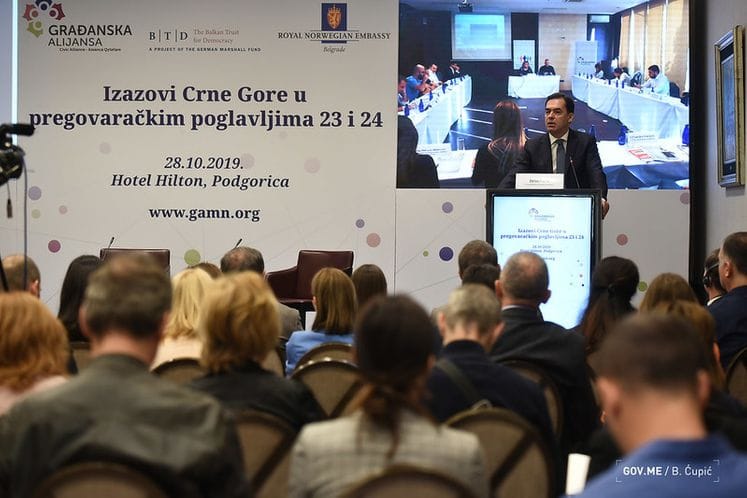- Government of Montenegro
DPM Pažin: Government cannot implement judicial la...
Please note: The page below represents the archived content relating to the previous Government of Montenegro. Some of the information might be inaccurate or outdated.
Archive
DPM Pažin: Government cannot implement judicial laws instead of judiciary

Published on: Oct 28, 2019 • 6:00 PM Author: PR Service
It is natural that the Government is responsible for the state of crime in society but the Government in Montenegro is exempt from all mechanisms to determine responsibility for the prosecution results, Deputy Prime Minister for Political System, Interior and Foreign Policy Zoran Pažin stated at the opening of the conference "Challenges of Montenegro in Chapters 23 and 24" which was held today in Podgorica.
The Deputy Prime Minister stressed that the Prosecution is, in the constitutional systems of the most developed democratic countries, an integral part of the executive authority, in order to make that executive authority responsible for state of crime in society.
"Today, it is not ridiculous to expect that the Government provides answers to questions on quality of the Prosecution work. The legislature has little more competence, but even legislature does not have all the necessary mechanisms to properly supervise the work of the Prosecution. Today, no legal theorist or practitioner can answer the question of which branch of government the Prosecution belongs," the Deputy Prime Minister noted. He added that a serious analysis of those of parameters that are important for the rule of law points to the fact that the Prosecution in Montenegro is more independent even of the judiciary.
The Deputy Prime Minister pointed to the fact that such constitutional solutions, which were introduced in 2013, were strongly insisted on by representatives of opposition political parties and a political party that was in power at the time, but it is in the opposition now. "I do not notice that these political parties are now leading the way in seeking answers to the problems arising as a consequences of these constitutional solutions," DPM Pažin stated adding that in 2013, while taking participation in the work of the Venice Commission, he firmly opposed such a solution that has no basis in most developed modern democracies.
DPM Pažin noted that today we have a kind of disturbed democratic balance that political minority's opinion that bearers of judicial power should not be elected in the Judicial Council is more important, than it is political majority's opinion that they should be elected. He added that they are respectable jurists elected by the Parliament of Montenegro.
He emphasised that in previous years it has been invested a lot in education of judges, prosecutors and representatives in independent regulatory bodies and agencies, adding that it is necessary to make the assessment of the efforts of these activities. "Conferences, seminars, educations, study tours sometimes to the exotic places such as Mauritius or the Philippines, open the question of what could be learned at these destinations and whether anyone has addressed the evaluation of the knowledge as a consequence of those educations. In the upcoming period it should be insisted on the evaluation of knowledge as a consequence of the education," DPM Pažin highlighted, adding that the aim of education is to increase the level of expertise and professionalism and ultimately achieve benefits for citizens.
The Deputy Prime Minister assessed as deeply wrong the view that Albania and especially North Macedonia would not be allowed to start accession negotiations with the EU, emphasising that this at all should not be an alibi for the failures in Montenegro itself.
"There is no enigma about what should be done. It takes the necessary energy and responsibility to put into action. But that perception which is sometimes present in public that the Government is responsible for overall integration process is deeply wrong. The Government cannot implement judicial laws instead of the judiciary. Therefore, everyone should bear its share of responsibility," the Deputy Prime Minister concluded.
OFFICE OF THE DEPUTY PRIME MINISTER
Related articles:
Presidents of northern municipalities: The Emirates and Alabbar are welcome in Montenegro Mar 24, 2025
Statement by Deputy Prime Minister Aleksa Bećić Mar 24, 2025
Is this page useful?
